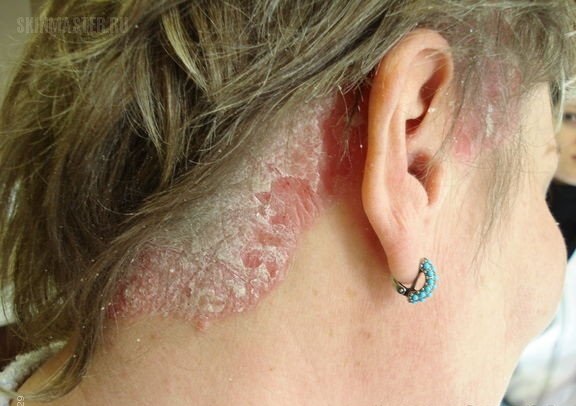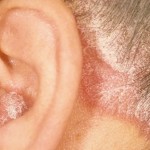Scalp Psoriasis Is Very Common

Scalp psoriasis is one of the most common forms of psoriasis, with over half of all psoriasis sufferers suffering from it. Having psoriasis of the scalp can be embarrassing and very uncomfortable indeed. To help you get the best out of your natural scalp treatments, I’d like to share the following information and tips with you, information I’ve found through my many years of treating psoriasis patients to include some of the best self-help information.
Article of interest:
You may have noticed that psoriasis appears most commonly on the knees and elbows, but it can affect any part of the skin. The scalp is characteristically affected in many people who have psoriasis. Scalp plaques produce excess scale and can itch, just like plaques that can exist literally anywhere on a person’s body.
If the scalp psoriasis is particularly severe, it can even cause a loss of scalp hair, which usually will return if the psoriasis can be controlled. The problem with scalp psoriasis however is that it can be difficult to treat when the scalp is covered with hair sufficient to act a barrier to the application of various medications that are applied topically.
What Kind Of Person Gets Scalp Psoriasis?
The truth is, anybody who has psoriasis can get scalp psoriasis because it is one of the most common places on the body to experience psoriasis. Psoriasis researchers have discovered that around half of all people who experience plaque psoriasis will probably have at least one if not more flare-ups of psoriasis involving the scalp region.
What Causes Scalp Psoriasis?
The causes of psoriasis are the same, regardless of what form of psoriasis it is. When a person’s immune system has faulty signals that tells the skin’s cells to grow too quickly, the person has developed psoriasis. New skin cells are supposed to form over a period of weeks in a healthy person, but in a person with psoriasis, skin cells can develop in a matter of days. The problem is that these rapidly growing skin cells have a tendency to pile up on the skin’s surface, causing the psoriasis skin to appear.
The 7 Signs And Symptoms Of Scalp Psoriasis

Scalp psoriasis is a very common form of psoriasis that I’ve seen in many patients over the years, it is in fact one of the most common kinds of psoriasis many will experience who have this chronic skin condition. It commonly occurs behind or around the ears, as you will see on the images on this page. It may cause silvery-white scales that can be most annoying and even quite embarrassing for many people. People who experience scalp psoriasis not only find that it may occur around the ear, it can occur at the crown of the head or affect any other part of the scalp. Apart from producing white, silvery flakes of skin that can fall onto your clothes or in your bed, it may also cause temporary hair loss which can be even more embarrassing than those skin flakes.
Sometimes a small patch of psoriasis develops as a result, which can be easy to hide with hair, especially if you allow your hair to grow longer. Unfortunately for some, scalp psoriasis can even cover the entire scalp. When psoriasis does appear on the scalp, you may notice the following:
These seven signs and symptoms are typical of scalp psoriasis, they can vary from person to person in their severity and they can come and go. Some psoriasis patients I have known experience one or more of these signs and symptoms as only mild flare-ups, whereas others will experience them as more severe flare-ups. Many things can trigger or cause a flare-up, including stress, cold, and dry air.
Scalp Psoriasis Diagnosis And Treatment
Scalp psoriasis stems from excessive cell growth and can lead to large white flaky patches of skin and severe dandruff, on top of the uncomfortable itching and even stinging or burning sensations. It’s not hard to diagnose scalp psoriasis, but it’s incredible how many people get it wrong in my opinion. I’ve seen many patients over the years with eczema who were diagnosed as having psoriasis. You may like to read the page entitled Psoriasis Diagnosis to familiarize yourself with the correct ways to diagnose this all too common skin complaint. Take a good look at the image above and you will be able to see the silvery, dry skin flakes that so so characteristic of scalp psoriasis.
Scalp Psoriasis Affects Everyone Differently
Natural Scalp Psoriasis Treatment

The Natural Psoriasis Treatment Program website was created to inform on the psoriasis treatments you may be interested in administering to avoid unwanted side effects and to be the most effective and pro-active in preventing those flare ups and skin outbreaks. As an experienced clinician I feel it is important to inform you on the pros and cons of both conventional pharmaceutical treatments as well as natural psoriasis healing methods in order for you to make an informed choice right now as to what will be the most effective and clinically-proven psoriasis treatment option for you.
There are different ways to treat psoriasis but a natural psoriasis treatment is what most moderate to severe psoriasis sufferers end up looking for in my experience, particularly after they have tried and exhausted other methods of treatment. Be sure to read my topical treatments for psoriasis page, it is packed with many different natural hints and tips on how you can get your skin in top shape without the worry of all those chemicals.
There are many different ways to treat the symptoms of psoriasis and there are literally countless topical and systemic treatments that are commercially available. Chances are that you are one of the fifty percent of psoriasis sufferers who is unhappy with conventional treatment, and that’s why you are looking at this website right now.
There are many different websites you may like to look at when it comes to treating your psoriasis, and the website of The National Psoriasis Foundation is quite a good resource when it comes to providing you with biological, pharmaceutical, and consumer information on the many different treatments that might be prescribed by your medical doctor or dermatologist. They even have some information on various natural treatments, although their information is mostly conventional medical psoriasis treatments.
It is important for you to remember that psoriasis is considered an auto-immune disease by nature, and that there is NO miracle drug, herb or vitamin that will “cure” it. The most effective treatment means a holistic treatment program, a combined effort of medication (natural or drug-based), a healthy psoriasis diet, exercise as well as topical treatments that all contribute to minimizing those unwanted flare-ups and ease discomfort.
Over The Counter Scalp Psoriasis Treatments
There are many different kinds of topical treatments available over the counter, but sometimes a product like “Head and Shoulders” just isn’t good enough. You may have heard about coal tar treatments, they can certainly help to slow skin growth and reduce any itchiness, but who wants to smell like a petrochemical factory? You will find that a lot of consumer psoriasis shampoo products will contain anywhere from 0.5 up to 2 percent coal tar.
10 Tips For Managing Scalp Psoriasis
Lifestyle Management Of Scalp Psoriasis
Scalp psoriasis responds particularly well to a positive and healthy lifestyle change, I’ve witnessed this countless times with many psoriasis patients. Apart from medical treatments, if you incorporate healthy behavioral patterns into your daily routine and regularly adhere to certain practices you will be able to keep any skin flare-ups, outbreaks and any aggravations of your symptoms to a minimum. I’d like you to read my Sun and Sea article and also The Psoriasis Lifestyle page for more detailed information on just how you can incorporate these healthy lifestyle practices into your routine.
You will find that some psoriasis websites and blog sites may mention detailed information on how you can add for example certain essential oils into your conventional psoriasis shampoo that will assist in keeping your scalp hydrated and moist, whereas others may give you some information on foods to avoid and to eat. Other websites like WebMD will inform you that coal tar and salicylic acid are two over-the-counter products approved by the FDA for psoriasis.
Unfortunately, most of these web sites fail to give you the complete picture when it comes to the healthiest psoriasis lifestyle, that not only includes natural psoriasis skin care, natural psoriasis diet information and the best exercise. I’ve yet to see a natural health psoriasis website that mention of the importance of adrenal fatigue and stress when it comes to improving your psoriasis naturally.
Make sure you wear lighter clothing with scalp psoriasis, especially your top, it will do a much better job of hiding any potentially skin flakes from showing. Preventing these flakes and any dandruff in the first place should be your main aim.
Putting It All Together

After more than two decades of treating those with psoriasis, I realized that it was time to formulate a natural treatment program that could make a big difference to the lives of those affected by psoriasis, especially those patients who had become dissatisfied with conventional medical treatment of their psoriasis.
Unlike any other approach you may have attempted before, The Psoriasis Program addresses every facet of psoriasis from every possible trigger and cause, the inflammation, right down to the very best natural skin treatments . The Psoriasis Program has been used by thousands of psoriasis and psoriatic arthritis sufferers in over 50 countries with unparalleled success. It breaks psoriasis treatment down into a simple, easy to understand, and step-by-step approach that anyone of any age or any stage of psoriasis can use, even if
you’ve been treated with strong psoriasis drugs for many years.
You don’t have to continue relying on doctors who have no answers, nor spend thousands of dollars to see skin specialists who still aren’t trained to effectively address all of your needs when it comes to helping you improve all aspects of your health, besides just your skin. The purpose of the Psoriasis Program is to put the power back into your hands and to arm you with the knowledge to naturally and permanently reduce those psoriasis outbreaks and reclaim your life!
